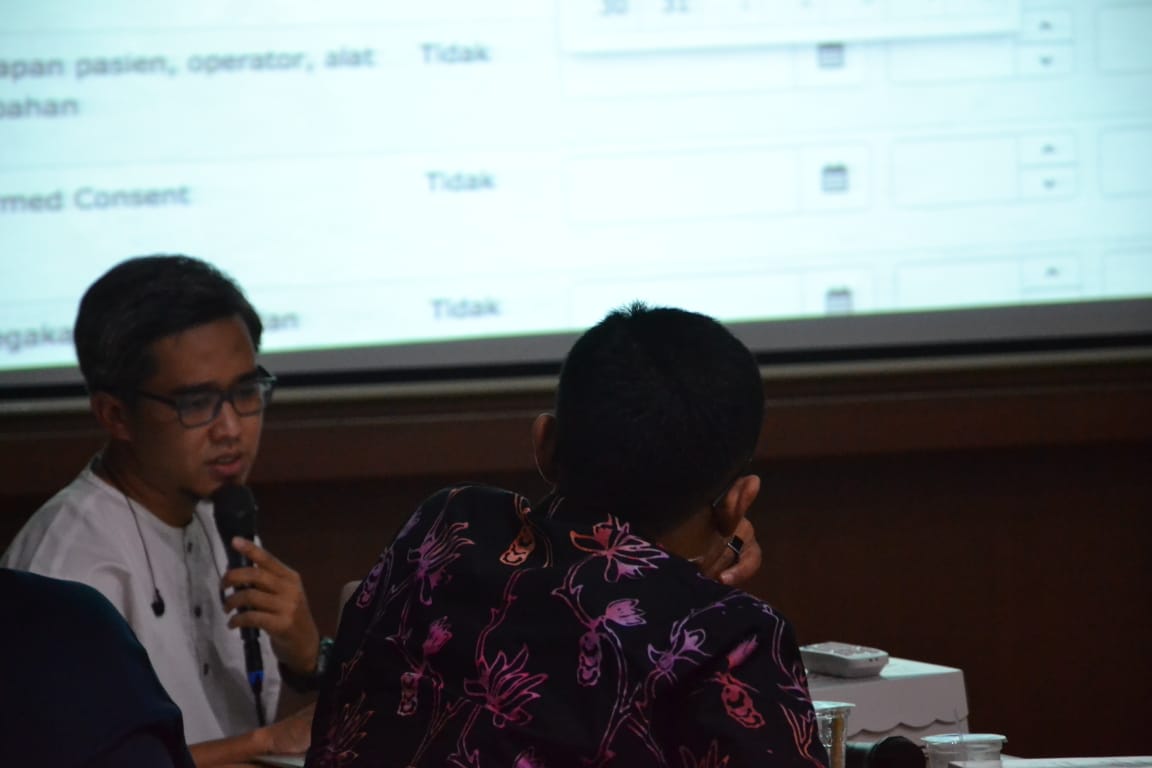UNAIR NEWS – Digital Academic Multiapps (DAM) is a network-based software (web) developed to help the academic community of Faculty of Dental Medicine UNAIR in recording their data. The web-based application was developed by FKG UNAIR information system innovation unit team headed by Gilang Rasuna Sabdho Wening drg., M.Kes. or known as Doctor Gilang.
At the inaugural launch of DAM on Monday, December 12 in Meeting Room of FKG UNAIR Dean, Doctor Gilang explained that there were four features in DAM. Advanced Environmental Gates of Information (AEGIS), Extended Algorithm E-mail System (Enamail System), Online Study Plan Cards (KRS) for Professional education and Online Academic Information Systems (SIAKAD) for Professional Education.
Advanced Environmental Gates of Information (AEGIS)
AEGIS was developed so that FKG UNAIR academic community can store, access data quickly, precisely, and accurately, especially in the fields of all fields in FKG. In fact, AEGIS is also equipped with online diploma authentication feature for alumni.
“AEGIS stores and presents more detailed data, complete and comprehensive data and minimizes the risk of data loss,” said Doctor Gilang.
Even though you can authenticate it online, alumni can also ask for a physical form if the company or agency cannot accept it. In the future many companies that accept the online form will be equipped with barcodes.
Extended Algorithm E-mail System (Enamail System)
The Enamail system was developed as FKG UNAIR is the oldest dental medicine institution in Indonesia and the second oldest faculty after FK in UNAIR and it has thousands of graduates spread throughout the world. So, FKG often receives thousands of emails from alumni, which makes the e-mails rarely replied.
“For this reason, the enamail system, FKG UNAIR can reply e-mails from thousands of alumni by pressing a single button. The reply will be on behalf of the dean, vice dean, and lecturers in FKG, “explained Doctor Gilang.
Online Study Plan Card (KRS)
Online KRS for Professional Education is deemed necessary as cybercampus only accommodates S1, S2, and S3 education. Meanwhile, professional education program’s curriculum is based on training items or specific competencies regarding the skill of handling dental patients. For example, in FKG there are techniques to extract teeth, fill teeth, and other assessment items specifically given in professional education.
“Because the cybercampus has not accommodated them, we feel the need for an application that can help management, lecturers, or students, especially professional education so that it is easier to report the results of their daily actions,” explained Doctor Gilang who is also a lecturer in FKG.
Through online KRS and learning evaluation, the faculty is really helped. Furthermore, students can also validate and report their actions online.
Online Academic Information System (SIAKAD) for Professional Education.
In this feature, lecturers can give marks to students real-time, fast, and free of manipulation. In addition, achievement of students on their clinical learning, evaluation of dental medicine professional education, and other facilities can also be seen from SIAKAD.
In SIAKAD, there are standards that have been agreed upon by lecturers related to the assessment system. Thus, there is clarity regarding the assessment system for students.
“After launching today, DAM can be used by the entire FKG academic community,” he said.
Difference from Cybercampus
In contrast to cybercampus, DAM makes it easier for internal management of FKG to recap the internal achievements and shortcomings which are not accommodated by cybercampus .
For example, for the facilities and infrastructure section of FKG, especially professional education and laboratory. All this time, the data on the use of tools and materials in the laboratory is still recorded with books, paper, and even oral notes.
“With the system that has been built, recording can be done realtime, online, so for things that have not been accommodated by cybercampus can be more detailed in DAM,” concluded the doctor Gilang. (*)
Author: Galuh Mega Kurnia
Editor: Binti Q. Masruroh





